And it's one of the main reasons for a screenplay to get tossed instead of read ?
One of the 13 rules to write original dialogues talks about the use of dialogue techniques.
Today, the setup and payoff technique.
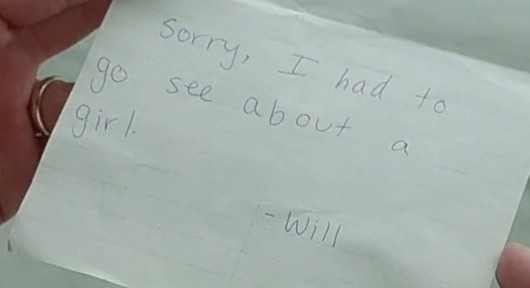
We asked David - aka Blablator, our dialogue expert, to lead us through this technique.
Blablator:
This is a movie dialogue technique that's made of 2 steps:
-- in the first step a character says something that sounds ordinary, sometimes anecdotic, basically a throwaway; that's the setup
-- in the second step the same character or another one who heard the setup line repeats it or makes a variation around it; that's the payoff.
In some cases, especially when the same character takes care of both the setup and payoff, the payoff is played more than once, to increase the comic effect.
In some cases, when the setup line is actually crucial in the story - although it doesn't look like it at the time the setup line is spoken - the payoff is played only at the end of the screenplay, i.e. at the climax or at the conclusion.
Whatascript!:
You mentioned a comic effect, are there other effects intended with this movie dialogue technique?
Blablator:
Yes. And it depends on the context. It could be for example to pay someone back, make a sarcastic comment, acknowledge the person or show complicity. Again, it depends on the line and on the context.
Whatascript!:
Any example illustrating the same character applying both steps of this setup and payoff movie dialogue technique?
Blablator:
Yes, it's from Basic Instinct.
Remember Catherine Tramel from the unexpected movie dialogue technique?.
As you know, Johnny Boz, her boy-friend is found dead at the very start of the screenplay, and the detectives Nick Curran and Gus Moran, as well as the Lt Walker are at the crime scene.
Note: these examples are re-formatted to show the setup and payoff next to each other.
| Setup | Payoff |
|---|---|
| LT. WALKER: Nobody say anything. The maid came in an hour ago and found him. She's not a live-in. GUS: Maybe the maid did it. |
This is the setup.
By the way, notice the use of another movie dialogue technique in these lines, namely the trigger movie dialogue technique: "the maid came ..." followed by "Maybe the maid".
| LT. WALKER: She's 54 years old and weighs 240 pounds. THE CORONER'S GUY (deadpan): There are no bruises on his body. | GUS(grins): It ain't the maid. |
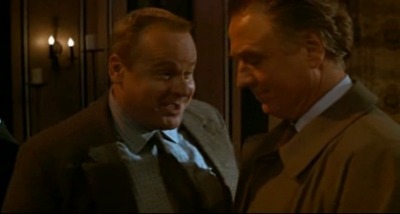
This is the first payoff.
| LT. WALKER: He left the club with his girlfriend about midnight. That's the last time anybody saw him. NICK (looks at body): What was it? THE CORONER'S GUY: Ice pick. Left on the coffee table in the living room. Thin steel handle. Forensics took it downtown. HARRIGAN: There's come all over the sheets -- he got off before he got offed. | GUS: (deadpan): That rules the maid out for sure. |
This is the second and final payoff.
By the way, the sentence "he got off before he got offed" is an example of another movie dialogue technique, called "homophone": you use words that sound the same but have a different meaning. It is often used to cause a comic effect.
Whatascript!:
Any example of this movie dialogue technique when the setup and payoff lines are said by 2 different characters?
Blablator:
Yes. These examples come from the screenplay Good Will Hunting.
When there are 2 characters involved, it's like if the first character "gives" something to the other character at the setup. And that something could be funny, sarcastic, offensive or anything else.
And later on, in the same scene, or in a different scene, the other character "gives it back". That's the pay-off. This line, when it is used for the second time, echoes with what got said before.
Will Hunting, who works as a janitor at MIT, gets caught red-handed by Professor Lambeau while writing the solution of a math proof on the chalkboard. He doesn't show up the next day at work.
His friend Morgan (right on the picture) teases him about losing his job. Chuckie and Billy (left and right in the back), participate to the conversation. 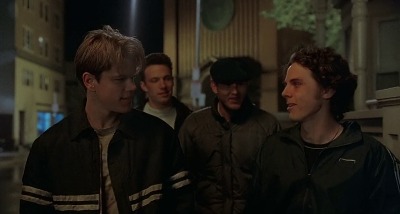
| Setup | Payoff |
|---|---|
| MORGAN: (starts laughing): How fuckin' retarded do you have to be to get shit-canned from that job? How hard is it to push a fuckin' broom? CHUCKIE: You got fired from pushing a broom, you little bitch. MORGAN: Yah, that was different. Management was restructurin'-- |
This is the setup.
Notice again the use of the trigger movie dialogue technique. The words "push a fuckin'broom" get followed by "pushing a broom".
| BILLY: Yah, restructurin' the amount of retards they had workin' for them. MORGAN Fuck you, you fat fuck. BILLY Least I work for a livin'. (to Will) Why'd you get fired? | WILL: Management was restructurin'. |
That's the payoff.
Notice again the use of the trigger movie dialogue technique after the setup line "Management was restructurin', which is followed by "restructurin' the amount of retards".
Will tells the therapist he's assigned to, Sean Maguire, that he met a girl, Skylar and had a good time with her. 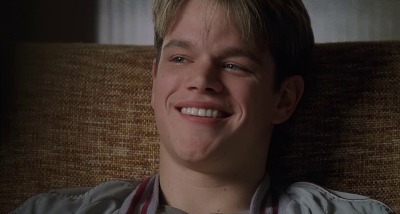
He's however afraid of going out again with her. Sean tells him he's an amateur.
| Setup | Payoff |
|---|---|
| WILL:: I know what I'm doing. She's different from the other girls I met. We have a really good time. She's smart, beautiful, fun... SEAN: So Christ, call her up WILL: Why? So I can realize she's not so smart. That she's boring. You don't get it. Right now she's perfect, I don't want to ruin that. | SEAN: And right now you're perfect too. Maybe you don't want to ruin that. Will says nothing. |
This is the setup, immediately followed by the payoff and another setup, which will be paid off a bit later:
| SEAN: But I think that's a super philosophy, Will. That way, you can go through your entire life without ever having to really know anybody. --- later in the scene: | WILL You ever think about gettin' remarried? SEAN My wife's dead. WILL Hence, the word remarried. SEAN She's dead. WILL Yeah, well, I think that's a super philosophy, Sean. I mean, that way, you can actually go through the rest of your life... without ever really knowing anybody. SEAN Time's up. |
The "Time's up" which ends this scene is itself the payoff of a setup line that Will said during the first encounter he had with Sean.
In that scene Will was very obnoxious. Their meeting escalated into a physical argument, that Will ended up by: "Time's up" - in reference to their sessions that lasted one hour.
Sean in a session with Will about the question: "what do you want"
| Setup | Payoff |
|---|---|
| SEAN:: I just have a little question here. You could be a janitor anywhere. Why did you work at the most prestigious technical college in the whole fuckin' world? Why did you sneak around at night and finish other people's formulas... that only one or two people in the world could do and then lie about it? 'Cause I don't see a lot of honor in that, Will. So what do you really wanna do? WILL: I wanna be a shepherd. SEAN: Really? WILL: I wanna move up to Nashua, get a nice little spread, get some sheep and tend to them. |
This is the setup.
The scene goes on until:
| SEAN: Look at me. What do you wanna do? You and your bullshit. You got a bullshit answer for everybody. But I ask you a very simple question and you can't give me a straight answer, because you don't know. I'll see ya, Bo-peep. WILL: Fuck you. | SEAN: You're the shepherd. |
And this is the payoff.
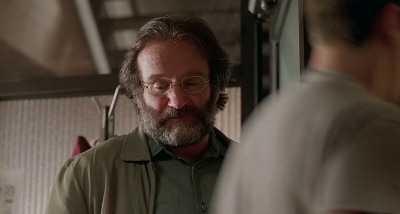
Whatascript!:
You mentioned that in some cases the first element of this movie dialogue technique (setup) gets only paid off at the end of the screenplay when it plays an important role in the story. Any example?
Blablator:
Again, from Good Will Hunting.
All the lines used in above examples were basically said to pay someone back.
This one is not. It's an acknowledgment from Will to Sean for the difference he made in his life.
It shows also the transformation of Will, who's now ready to trust himself and someone else (Sean).
Last example of this movie dialogue technique. Sean in a session with Will about when he met his wife and knew she was the one.
| Setup | Payoff |
|---|---|
| SEAN:: You should have seen this girl. She lit up the room. WILL: I don't care if Helen of Troy walked into that bar! That's game six of the World Series! Sean smiles. WILL: And what kind of friends are these? They let you get away with that? SEAN:: I just slid my ticket across the table and said "sorry fellas, I gotta go see about a girl." |
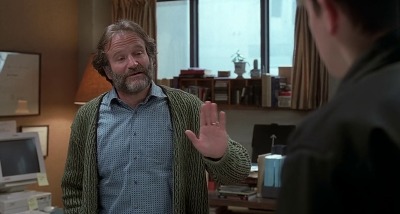
| WILL "I gotta go see about a girl"? What did they say? SEAN:: They could see that I meant it. WILL You're kiddin' me. SEAN:: No Will, I'm not kiddin' you. |
This is the setup which happens after 1 hour and 5 minutes.
The second element of this movie dialogue technique (payoff) only happens in the last scene of the screenplay, i.e. 1 hour later when Will finally knows what he wants. He turns down the job offered and decides to go to California to join his girl friend Skylar.
Will slips an envelope in Sean's mailbox and drives away.
| Sean opens the card Will left for him. It reads: WILL (in writing) Sean -- If the Professor calls about that job, just tell him, "Sorry, I had to go see about a girl." |

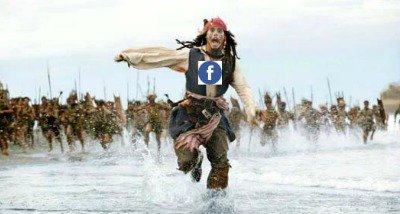
You may not realize it but by taking this simple action you
empower us to write more articles like that - one Comment/Like/Share at a time.
Thanks for that.
Picture and screenplay extracts:
-- "Basic Instinct" - George Dzundza, Benjamin Mouton, Sharon Stone, Michael Douglas; Joe Eszterhas (screenplay), Jan de Bont (cinematography), Paul Verhoeven (director)
--"Good Will Hunting" - Matt Damon, Casey Affleck, Ben Affleck, Cole Hauser, Robin Williams; Matt Damon & Ben Affleck (screenplay); Jean Yves Escoffier (director of Photography); Gus van Sant (director)
Go from Setup and Payoff Movie Dialogue Technique to
Whatascript! Home page
* Saving Private Ryan, screenplay written by Robert Rodat